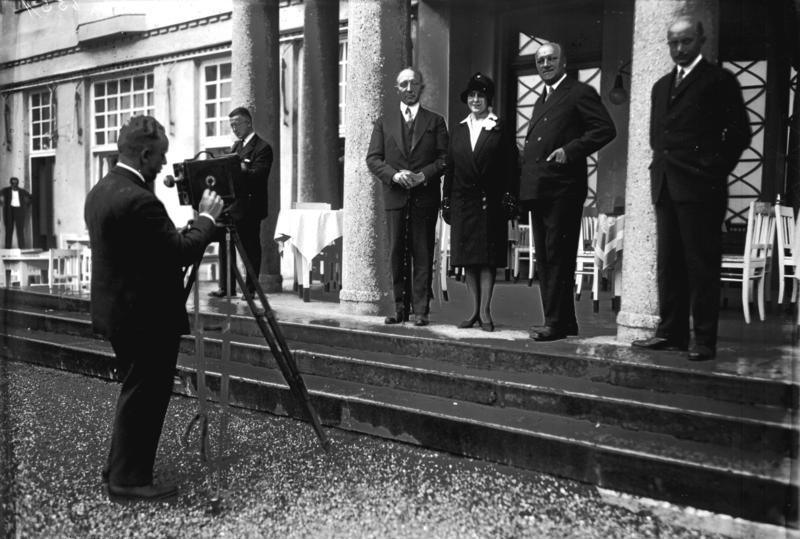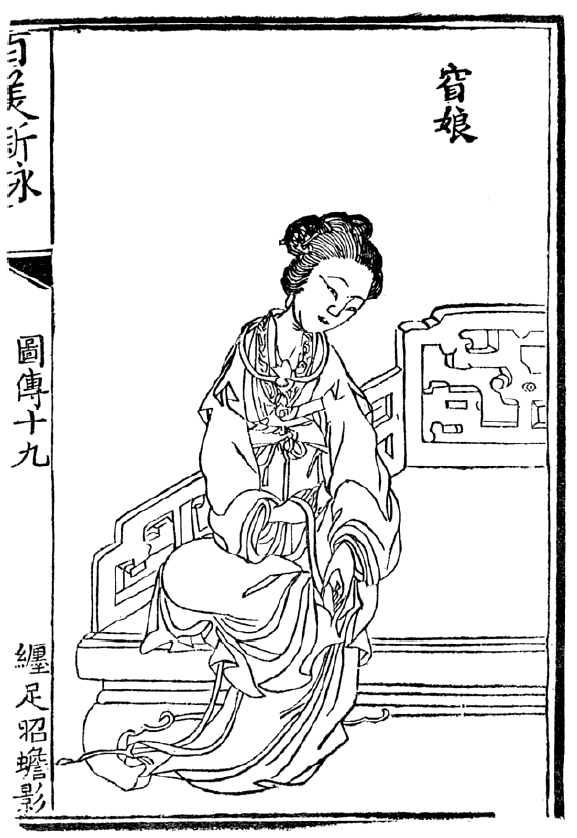|
Nadine Hwang
Nadine Hwang, or Nadine Huong (Chinese ; (March 3, 1902 – 1972) was one of the first Chinese female pilots and served in the Chinese Air Force as an honorary colonel. The lawyer used diplomatic skills and her versatile abilities to live in different countries. She was mistress of Natalie Clifford Barney and survived deportation to Ravensbrück concentration camp. Early life Nadine Hwang was born in Madrid, to a Belgian mother, Juliette Brouta-Gilliard, and a Chinese father, Lühe Hwang. Both her parents were Catholics. Nadine was baptized in June 1902 in Madrid, in the parish church of Nuestra Señora del Pilar. Her father, who came from an influential Chinese family, was a diplomat and high official. Fluent in Spanish, he was transferred to Madrid at the beginning of his career as secretary of the 1st legation, where he met his future wife Juliette Brouta-Gilliard. In 1904 he was briefly transferred to Havana, where in 1905 Hwang's sister Marcela was born, later the writer ... [...More Info...] [...Related Items...] OR: [Wikipedia] [Google] [Baidu] |
Madrid
Madrid ( , ) is the capital and most populous city of Spain. The city has almost 3.4 million inhabitants and a metropolitan area population of approximately 6.7 million. It is the second-largest city in the European Union (EU), and its monocentric metropolitan area is the third-largest in the EU.United Nations Department of Economic and Social AffairWorld Urbanization Prospects (2007 revision), (United Nations, 2008), Table A.12. Data for 2007. The municipality covers geographical area. Madrid lies on the River Manzanares in the central part of the Iberian Peninsula. Capital city of both Spain (almost without interruption since 1561) and the surrounding autonomous community of Madrid (since 1983), it is also the political, economic and cultural centre of the country. The city is situated on an elevated plain about from the closest seaside location. The climate of Madrid features hot summers and cool winters. The Madrid urban agglomeration has the second-la ... [...More Info...] [...Related Items...] OR: [Wikipedia] [Google] [Baidu] |
Aragon
Aragon ( , ; Spanish and an, Aragón ; ca, Aragó ) is an autonomous community in Spain, coextensive with the medieval Kingdom of Aragon. In northeastern Spain, the Aragonese autonomous community comprises three provinces (from north to south): Huesca, Zaragoza, and Teruel. Its capital is Zaragoza. The current Statute of Autonomy declares Aragon a '' historic nationality'' of Spain. Covering an area of , the region's terrain ranges diversely from permanent glaciers to verdant valleys, rich pasture lands and orchards, through to the arid steppe plains of the central lowlands. Aragon is home to many rivers—most notably, the river Ebro, Spain's largest river in volume, which runs west–east across the entire region through the province of Zaragoza. It is also home to the highest mountains of the Pyrenees. , the population of Aragon was , with slightly over half of it living in its capital city, Zaragoza. In 2020, the economy of Aragon generated a GDP of million, w ... [...More Info...] [...Related Items...] OR: [Wikipedia] [Google] [Baidu] |
Bohemianism
Bohemianism is the practice of an unconventional lifestyle, often in the company of like-minded people and with few permanent ties. It involves musical, artistic, literary, or spiritual pursuits. In this context, bohemians may be wanderers, adventurers, or vagabonds. Bohemian is a 19th-century historical and literary topos that places the milieu of young metropolitan artists and intellectuals—particularly those of the Latin Quarter in Paris—in a context of poverty, hunger, appreciation of friendship, idealization of art and contempt for money. Based on this topos, the most diverse real-world subcultures are often referred to as "bohemian" in a figurative sense, especially (but by no means exclusively) if they show traits of a precariat. This use of the word in the English language was imported from French ''La bohème'' in the mid-19th century and was used to describe the non-traditional lifestyles of artists, writers, journalists, musicians, and actors in major Europea ... [...More Info...] [...Related Items...] OR: [Wikipedia] [Google] [Baidu] |
Empire Of Japan
The also known as the Japanese Empire or Imperial Japan, was a historical nation-state and great power that existed from the Meiji Restoration in 1868 until the enactment of the post-World War II 1947 constitution and subsequent formation of modern Japan. It encompassed the Japanese archipelago and several colonies, protectorates, mandates, and other territories. Under the slogans of and following the Boshin War and restoration of power to the Emperor from the Shogun, Japan underwent a period of industrialization and militarization, the Meiji Restoration, which is often regarded as the fastest modernisation of any country to date. All of these aspects contributed to Japan's emergence as a great power and the establishment of a colonial empire following the First Sino-Japanese War, the Boxer Rebellion, the Russo-Japanese War, and World War I. Economic and political turmoil in the 1920s, including the Great Depression, led to the rise of militarism, nat ... [...More Info...] [...Related Items...] OR: [Wikipedia] [Google] [Baidu] |
Grace Marguerite Hay Drummond-Hay
Grace Marguerite, Lady Hay Drummond-Hay (née Lethbridge, 12 September 1895 – 12 February 1946) was a British journalist, who was the first woman to travel around the world by air (in a zeppelin). Although she was not an aviator herself at first, she contributed to the glamour of aviation and general knowledge of it, by writing articles about her aerial adventures for US newspapers in the late 1920s and early 1930s. Early life Grace Lethbridge was the eldest daughter of Sidney Thomas Lethbridge and his wife Grace Emily (née Willis). Her father was the managing director of the Spratt's dog and animal food company. Her father's sister was dancer Alice Lethbridge. She was married in 1920 to Sir Robert Hay Drummond-Hay (1846–1925) at the age of 25, her husband being nearly fifty years older.Sir Robert Hay-Drummond-Hay ThePeer ... [...More Info...] [...Related Items...] OR: [Wikipedia] [Google] [Baidu] |
Beiyang Government
The Beiyang government (), officially the Republic of China (), sometimes Chinese postal romanization, spelled Peiyang Government, refers to the government of the Republic of China (1912–1949), Republic of China which sat in its capital Peking (Beijing) between 1912 and 1928. It was internationally recognized as the legitimate Chinese government during that time. The name derives from the Beiyang Army, which dominated its politics with the rise of Yuan Shikai, who was a general of the Qing dynasty. After his death, the army split into various warlord factions competing for power, in a period called the Warlord Era. Although the government and the state were nominally under civilian control under a constitution, the Beiyang generals were effectively in charge of it. Nevertheless, the government enjoyed legitimacy abroad along with diplomatic recognition, had access to tax and customs revenue, and could apply for foreign financial loans. Its legitimacy was seriously challenge ... [...More Info...] [...Related Items...] OR: [Wikipedia] [Google] [Baidu] |
Zhang Zongchang
Zhang Zongchang (1881 – 3 September 1932) was a Chinese warlord in Shandong in the early 20th century. ''Time'' dubbed him China's "basest warlord". He was known by many nicknames such as the "Dogmeat General" (), based on the name of his favorite card game or tonic. Biography Early life and career Zhang was born in 1881 in Yi County (now Laizhou) in Shandong. His family was poor. Zhang's father worked as head shaver and trumpeter, and was an alcoholic. His mother was an exorcist and "practicing witch". His parents eventually separated. Zhang stayed with his mother who had taken a new lover. In his teens, Zhang's family moved to Manchuria, where Zhang became involved in petty crime in Harbin. He successively worked as a pickpocket, bouncer, and prospector. At some point, he worked in Siberia, learning Russian. Zhang eventually became a bandit in the Chinese countryside, though served as auxiliary for the Imperial Russian Army during the Russo-Japanese War in 1904–19 ... [...More Info...] [...Related Items...] OR: [Wikipedia] [Google] [Baidu] |
Foot Binding
Foot binding, or footbinding, was the Chinese custom of breaking and tightly binding the feet of young girls in order to change their shape and size. Feet altered by footbinding were known as lotus feet, and the shoes made for these feet were known as lotus shoes. In late imperial China, bound feet were considered a status symbol and a mark of feminine beauty. However, footbinding was a painful practice that limited the mobility of women and resulted in lifelong disabilities. The prevalence and practice of footbinding varied over time and by region and social class. The practice may have originated among court dancers during the Five Dynasties and Ten Kingdoms period in 10th-century China, and gradually became popular among the elite during the Song dynasty. Footbinding eventually spread to lower social classes by the Qing dynasty (1636–1912). Manchu emperors attempted to ban the practice in the 17th century, but failed. In some areas, footbinding raised marriage prospects. I ... [...More Info...] [...Related Items...] OR: [Wikipedia] [Google] [Baidu] |
Cricket
Cricket is a bat-and-ball game played between two teams of eleven players on a field at the centre of which is a pitch with a wicket at each end, each comprising two bails balanced on three stumps. The batting side scores runs by striking the ball bowled at one of the wickets with the bat and then running between the wickets, while the bowling and fielding side tries to prevent this (by preventing the ball from leaving the field, and getting the ball to either wicket) and dismiss each batter (so they are "out"). Means of dismissal include being bowled, when the ball hits the stumps and dislodges the bails, and by the fielding side either catching the ball after it is hit by the bat, but before it hits the ground, or hitting a wicket with the ball before a batter can cross the crease in front of the wicket. When ten batters have been dismissed, the innings ends and the teams swap roles. The game is adjudicated by two umpires, aided by a third umpire and match r ... [...More Info...] [...Related Items...] OR: [Wikipedia] [Google] [Baidu] |
Polo
Polo is a ball game played on horseback, a traditional field sport and one of the world's oldest known team sports. The game is played by two opposing teams with the objective of scoring using a long-handled wooden mallet to hit a small hard ball through the opposing team's goal. Each team has four mounted riders, and the game usually lasts one to two hours, divided into periods called ''chukkas'' or "''chukkers''". Polo has been called "the sport of kings", and has become a spectator sport for equestrians and high society, often supported by sponsorship. The progenitor of the game and its variants existed from the to the as equestrian games played by nomadic Iranian and Turkic peoples. In Persia, where the sport evolved and developed, it was at first a training game for cavalry units, usually the royal guard or other elite troops. A notable example is Saladin, who was known for being a skilled polo player which contributed to his cavalry training. It is now po ... [...More Info...] [...Related Items...] OR: [Wikipedia] [Google] [Baidu] |


.jpg)




